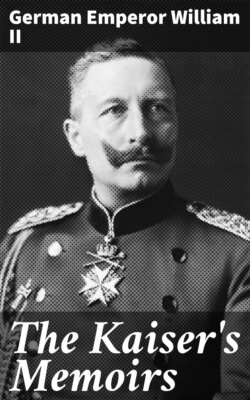Читать книгу The Kaiser's Memoirs - German Emperor William II - Страница 16
На сайте Литреса книга снята с продажи.
CONFLICT ON TURKISH POLICY
ОглавлениеTable of Contents
Upon my return from Constantinople in 1889 I described to the Prince at his request my impressions of Greece, where my sister Sophie was married to the heir-apparent, Crown Prince Constantine, and also my Constantinople impressions. In doing this, it struck me that Prince Bismarck spoke quite disdainfully of Turkey, of the men in high position there, and of conditions in that land. I thought I might inspire him in part with essentially more favorable opinions, but my efforts were of little avail. Upon asking the Prince the reason why he held such an unfavorable opinion, he answered that Count Herbert had reported very disapprovingly on Turkey. Prince Bismarck and Count Herbert were never favorably inclined toward Turkey and they never agreed with me in my Turkish policy—the old policy of Frederick the Great.
During the last period of his tenure of office as Chancellor, Bismarck declared that the maintenance of friendly relations with Russia, whose Tsar reposed special trust in him, was the most important reason for his remaining at his post. In this connection it was that he gave me the first hints concerning the secret reinsurance treaty with Russia. Up to then I had heard nothing about it, either from the Prince or the Foreign Office, although it happened that I had concerned myself especially with Russian matters.
When I assumed the reins of government owing to the early death of my father, the generation of the grandson, as I have already remarked, followed upon the generation of the grandfather, which meant that the entire generation of Emperor Frederick was overleaped. This generation, through its dealings with Crown Prince Frederick William, was imbued with many liberal ideas and projects of reform which were to be carried out under the direction of the Emperor Frederick. Upon his death, this entire generation, especially the politicians, found itself deceived in its hopes of exerting influence, and felt itself, to a certain extent, in the position of an orphan. Those belonging to it, despite the fact that they did not know my inner thoughts and aims, adopted a distrustful and reserved attitude toward me, instead of transferring their interest from the father to the son, for the purpose of furthering the welfare of the fatherland.
There was one exception to this—a representative of the National Liberals, Herr von Benda—a man still in the full bloom of youth. While I was still Prince I had made his acquaintance at the great hare hunts got up by Councilor Dietze at Barby. There Herr von Benda had won my affection and confidence when I, surrounded by older men, had listened to discussions on political, agricultural, and national-economic questions. In the course of these, Herr von Benda held my attention by means of his independent, interesting judgment. I accepted with pleasure an invitation to Benda's country seat, Rudow, near Berlin, and from this arose the custom of a regular yearly visit.
The hours spent in the family circle at Rudow stand out pleasantly in my memory. His talented daughters used to regale us with music. The political conversations there proved Herr von Benda to be a man of great foresight, which, free from partisan considerations, gave him an open mind as to the general needs of the state to an extent seldom found among members of political parties. He gave me many a helpful piece of advice for the future, drawn from the depths of his faithful, genuinely Prussian heart, by which he was attached firmly to the family of his sovereign; yet he was able to feel broad tolerance for other parties.
